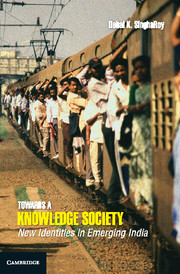Book contents
- Frontmatter
- Contents
- List of Tables and Figures
- Preface
- 1 Introduction: Conceptualising Knowledge Society: Critical Dimensions and Ideal Image
- 2 Critiquing and Contextualising Knowledge Society
- 3 Strategising for Knowledge Society in India: The Shifting Backdrops and Emerging Contexts
- 4 Education for Knowledge Society in India
- 5 Information and Communication Technologies for Knowledge Society
- 6 Indian Growth Story: Service and Knowledge Dynamics
- 7 Education, ICTs and Work: The Divergent Empirical Reality
- 8 Knowledge Society: Work, Workers and Work Relations
- 9 Knowledge Society: Culture, Continuity and Contradictions
- 10 Conclusion: Marginality, Identity, Fluidity and Beyond
- Bibliography
- Index
2 - Critiquing and Contextualising Knowledge Society
Published online by Cambridge University Press: 05 August 2014
- Frontmatter
- Contents
- List of Tables and Figures
- Preface
- 1 Introduction: Conceptualising Knowledge Society: Critical Dimensions and Ideal Image
- 2 Critiquing and Contextualising Knowledge Society
- 3 Strategising for Knowledge Society in India: The Shifting Backdrops and Emerging Contexts
- 4 Education for Knowledge Society in India
- 5 Information and Communication Technologies for Knowledge Society
- 6 Indian Growth Story: Service and Knowledge Dynamics
- 7 Education, ICTs and Work: The Divergent Empirical Reality
- 8 Knowledge Society: Work, Workers and Work Relations
- 9 Knowledge Society: Culture, Continuity and Contradictions
- 10 Conclusion: Marginality, Identity, Fluidity and Beyond
- Bibliography
- Index
Summary
The knowledge society recognises human mind as the site of progress, power and transformation by igniting it through appropriate knowledge, which uses knowledge as the key resource to produce wealth and employment, develops mechanisms for mass production and use of knowledge and places knowledge in the inner core of its all dynamics of this society. Through its engagement with the processes of production, use and dissemination of knowledge, founded in human intellectual potential and achieved qualities, the knowledge society has emerged to be the epitome of liberty, justice, equality and dignity; and has been envisioned not only to bring qualitative changes in its key agency, the people and in the pre-existing institutional arrangements, but also in the transformative dynamics of society. Though the knowledge society itself is sui generis, its emergence is not autonomous of the pre-existing societal arrangements. Thus, despite bringing profound changes in the social and institutional dynamics of society across the globe, it is yet to harmonise the world with prosperity, justice, equality and dignity for all. It has rather acquired paradoxical identities being the creator of wealth, innovation and hope and transformer of culture and institutions on the one hand, and the promoters of poverty, spurring greed, hardship and despair on the other. For its sustained association with the pre-existing evils of society, the knowledge society has been described with utmost caution to be the bearers of rationality, freedom and equality for the majority of humanity.
- Type
- Chapter
- Information
- Towards a Knowledge SocietyNew Identities in Emerging India, pp. 37 - 64Publisher: Cambridge University PressPrint publication year: 2014



